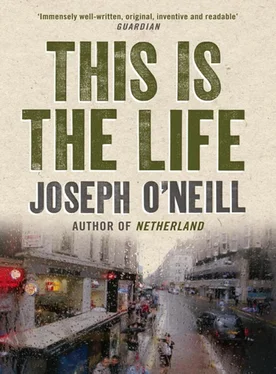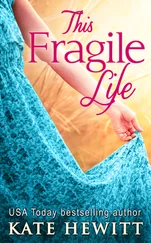I did what I often do in these situations: I ran myself a bath. Almost as soon as I stepped into the foggy, clammy bathroom I felt better. I drenched my face in hot water and leaned back neck-deep in the icebergs of bubbles that rose aromatically from the water. I rested my feet on the taps. Then, after I had slowly soaped my neck and arms and the tensions drained away from me, my patience and methodology returned. This rage for order was premature. I was being unprofessional, jumping the gun. At present I simply did not have enough facts at my disposal. There were xs and ys and z s that remained beyond me, but only for the time being. There was no need, as yet, to go and probe and question too deeply. Also, there were many things that I did not strictly need to know, many things which were irrelevant: I was, was I not, trying to understand Donovan v. Donovan , not Donovan (although, admittedly, the two were not entirely distinct — already they were beginning to intertwine). I had no doubt, in any event, that eventually, as ever, most things would fall into some satisfactory kind of order.
In this state of relaxation, something occurred to me about Donovan’s remarkable tears: London’s buried rivers. In olden times, I remembered reading somewhere, a series of urban rivers ran between the houses down to the Thames. Perhaps rivers, with its connotation of broad, surgy waterways, is the wrong word. Streams, I think, would be more accurate, because I am referring to trickling feeders of the Thames like the Fleet and the Tyburn. These streams no longer figure on any maps. One by one they have been buried alive by the city, vanishing deep under the cement and asphalt coat that covers the London earth. Nevertheless, you can still tell where they once flowed, their old beds revealed by the shallow valleys that dip perceptibly through certain streets and circuses. This does not mean that the streams have disappeared entirely. No, they are not to be suppressed so easily; they are still there, forcefully springing from the subsoil, making their way through pipes and underground channels; and yes, they still make their presence felt, crushed as they are by the city: after heavy rainfall cellars in Islington start flooding, the current in the Serpentine suddenly picks up. This is why Donovan’s tears on the golf course made me think of them: somewhere inside him there had been some sudden downpour.
Even as this quaint parallel came to me I knew that it would not take me very far. What I needed was information, not metaphors. Even so I derived comfort and a measure of illumination from it. In the absence of factual progress it reassured me to make this dreamy type of headway.
My wait-and-see approach was rewarded three days later, on Tuesday 6 December, when I received a fat and rather intriguing envelope from Philip Hughes. Inside it was a letter and a wad of correspondence. The letter was marked ‘Without Prejudice’ and it contained an offer: Arabella would accept a lump sum payment of £50,000 in full and final settlement if Donovan consented to the divorce petition. All things considered, it was not a bad offer. A bit of negotiation could lower the payment by £10,000, and given the uncertainties of a trial and the distress, inconvenience and expense that it would cause, leaving aside the substantial financial award which Arabella might receive, I would have warmly recommended it to Donovan in normal circumstances. But his instructions on this point were clear: he would not consent to the divorce, not at any price.
I turned to the second paragraph. Donovan, Hughes alleged, was molesting Arabella with the enclosed letters. Such correspondence was to cease immediately or an injunction would be obtained.
Hughes’s threat was over-dramatic, I thought, and not to be taken too seriously. If Donovan had threatened physical violence of some sort or had camped outside her house or bombarded her with telephone calls it would have been different. To complain of epistolary harassment was taking things a little far; no one forced her to read the letters. Then I thought, Wait a minute: letters?
I picked out the bundle from the envelope. My sticky fingers leaving faint fingerprints, I removed them from the elastic band and counted fourteen enclosed in airmail envelopes bearing colourful English, Swiss and French stamps. They had not been opened. I fingered them. They crackled in my hands. They gleamed and slid around in my fists like clean plates. Then I put them to one side. There was no question of examining their contents. These were private communications, I had no business with them. They were strictly between Donovan and his wife.
Why, then, if that was so, was I to be found five minutes later in the office kitchenette, bent over a grumbling kettle, holding envelopes over the plume of steam?
I only unsealed three letters. There was no time to do any more and I was receiving strange glances from my workmates. June, though, had no qualms about asking me what I was doing. It is part of her charm, this directness.
‘James, what on earth are you doing?’ she said.
‘I’m working,’ I said boldly. ‘What does it look like I’m doing?’ I yelped as the steam scalded my hand.
‘It looks like you’re opening mail you shouldn’t be,’ June said. That’s what it looks like.’
I gave her a reassuring smile, and continued steaming.
June said, ‘Well, I just hope you know what you’re doing.’
The first letter I unsealed was dated 28 September 1988, about a week after Donovan had received the petition and — again I consulted the chronology of the case that I had drawn up — the day after he had finished those rather curious exercises in his notebooks. (At that point I noticed something else for the first time: that Donovan had started his notebook exercises — his comeback, in other words — the day after he had received the petition. What was I supposed to make of that?) It was a strange letter. I had anticipated a billet-doux of some kind, some sort of plea from the heart: instead it read uncannily like the pleading in a statement of claim. Reading through it, I half-expected the short, pithy paragraphs (each making a distinct point) to be numbered and broken down into sub-paragraphs marked by Roman numerals.
The letter started by giving some facts as Donovan understood them. They had been married for just over twelve years. During that time they had had their ups and downs (I am paraphrasing, of course; I cannot reproduce that agreeable, eloquent voice which Donovan projected in his writing). Problems, difficult problems, had presented themselves and had been overcome. Why? Because the two of them had always valued their marriage. It was a precious thing which, until recently, they had always striven to preserve. So much, Donovan said, could not be in dispute. Then he moved on to his next point. Recently fresh difficulties had arisen, difficulties which had prompted her departure. Quite what those difficulties were Donovan was unable to say: Arabella had not voiced any specific grievances, she had merely packed her bags and left without a word, refusing to have any contact with him. Then, out of the blue, he had received her petition, filled with wild accusations of cruelty and neglect and unreasonableness. Why, if she set any store by their marriage (as she had often claimed) had she not discussed her grievances with him? If he was in the wrong about something (which he was forced to deny, not knowing exactly of what it was he was accused) then he would make amends. He would meet her complaint.
Then Donovan took an alternative scenario. Let’s say, he said, that Arabella no longer desired to save the marriage. Did that justify her not speaking to him? No; no, because it represented a fundamental development which needed to be discussed: it was a serious matter that affected both of them and it was only fair that, as a party to the marriage, he should be heard. Whichever way you looked at it, Donovan concluded, her refusal to speak to him was unfair and unjustifiable and accordingly her petition was ill-judged and over-hasty. Besides, he loved her. He wanted to see her. She only had to telephone his clerk and, subject to his not being tied up, he would put her straight through to him, no matter where he was in the world. He counted on her to come to her senses. He loved her, Donovan said again. He loved her with all his heart.
Читать дальше
Конец ознакомительного отрывка
Купить книгу












